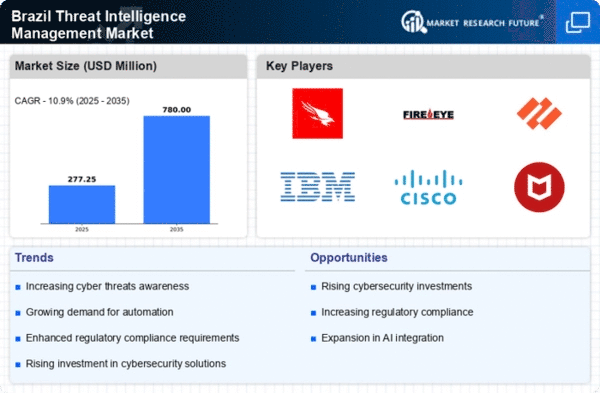Rising Cyber Threats
The escalating frequency and sophistication of cyber threats in Brazil are driving the demand for the threat intelligence-management market. Organizations are increasingly recognizing the need for robust cybersecurity measures to protect sensitive data and maintain operational integrity. In 2025, cybercrime is estimated to cost Brazilian businesses over $20 billion annually. This highlights the urgency for effective threat intelligence solutions. This environment compels companies to invest in advanced threat detection and response systems. As businesses face potential financial losses and reputational damage, the focus on proactive threat management becomes paramount, indicating a strong market trajectory.
Increased Digital Transformation
The ongoing digital transformation across various sectors in Brazil significantly impacts the threat intelligence-management market. As businesses migrate to cloud-based solutions and adopt digital technologies, they become more vulnerable to cyber threats. In 2025, it is projected that over 70% of Brazilian companies will have adopted cloud services, creating a pressing need for effective threat intelligence strategies. This shift necessitates the implementation of advanced threat detection and response mechanisms to safeguard digital assets. Consequently, the threat intelligence-management market is poised for growth as organizations seek to enhance their cybersecurity posture amidst rapid technological advancements.
Collaboration with Law Enforcement
The collaboration between private sector organizations and law enforcement agencies in Brazil is emerging as a crucial driver for the threat intelligence-management market. By sharing threat intelligence and best practices, businesses can enhance their cybersecurity measures and contribute to a collective defense against cybercrime. This partnership not only aids in the identification and mitigation of threats but also fosters a culture of security awareness. As more organizations engage in collaborative efforts, the demand for threat intelligence-management solutions is likely to increase. This synergy between sectors indicates a promising outlook for the market, as it strengthens the overall cybersecurity framework in Brazil.
Regulatory Compliance Requirements
Brazil's regulatory landscape is evolving, with stricter data protection laws such as the General Data Protection Law (LGPD) influencing the threat intelligence-management market. Organizations are mandated to implement comprehensive security measures to safeguard personal data, which necessitates the adoption of advanced threat intelligence solutions. Compliance with these regulations not only mitigates legal risks but also enhances consumer trust. As companies strive to align with LGPD requirements, the demand for threat intelligence-management tools is likely to surge. This regulatory pressure serves as a significant driver, pushing organizations to prioritize cybersecurity investments and integrate threat intelligence into their operational frameworks.
Growing Awareness of Cybersecurity Risks
There is a notable increase in awareness regarding cybersecurity risks among Brazilian businesses, which is driving the threat intelligence-management market. As high-profile cyber incidents make headlines, organizations are becoming more cognizant of the potential threats they face. This heightened awareness is prompting companies to invest in threat intelligence solutions to better understand and mitigate risks. In 2025, surveys indicate that approximately 60% of Brazilian firms plan to increase their cybersecurity budgets, reflecting a shift in priorities towards proactive threat management. This trend suggests a robust growth trajectory for the threat intelligence-management market as organizations seek to fortify their defenses.
















